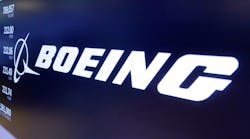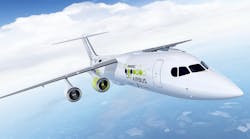The Boeing Co.’s venture-capital arm has taken a stake in a company developing battery technology for aerospace and industrial applications. Cuberg Inc. is a Berkeley, Calif.-based firm established in 2015 by former Stanford University researchers, and the developer of “an advanced battery cell that is designed to be a drop-in solution to existing large-scale battery manufacturing processes,” according to a Boeing statement.
Batteries present two problems for powering aircraft: weight and heat. The Cuberg technology combines a lithium metal anode, proprietary electrolyte, and high-voltage cathode, and would provide high energy-density and thermal durability, according to the OEM.
The value of Boeing’s investment and its share in Cuberg were not reported.
"Cuberg's battery technology has some of the highest energy density we've seen in the marketplace, and its unique chemistries could prove to be a safe, stable solution for future electric air transportation," according to Steve Nordlund, v.p. of Boeing HorizonX, the venture Boeing established last year to direct investment capital for technology commercialization and new market access.
Cuberg previously signed a multimillion-dollar joint-development agreement with an industrial battery manufacturer, Boeing reported. It is the first investment in energy-storage technology for HorizonX. Earlier stakes have been made in companies developing machine-learning technology; enterprise software for augmented-reality wearables used in manufacturing, field service, and logistics; and alternative propulsion aircraft.
The prospect of electric-powered aircraft seems remote now, in part because of the weight and functionality of batteries. In November, Airbus, Rolls-Royce, and Siemens established a partnership to develop hybrid electric-propulsion technology for commercial aircraft.
Cuberg co-founder and CEO Richard Wang explained in a CNBC interview that his company’s effort is seeking a battery made from components that are lighter and less flammable than current technology, and hopes to test a prototype late this year.
"With funding from Boeing, we will expand both our team and our research and development facilities to help customers integrate our batteries into their products, while also scaling up our technology to fully automated production," Wang said.








